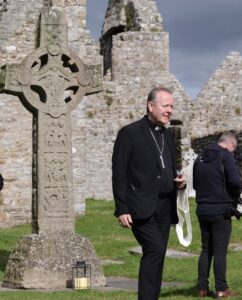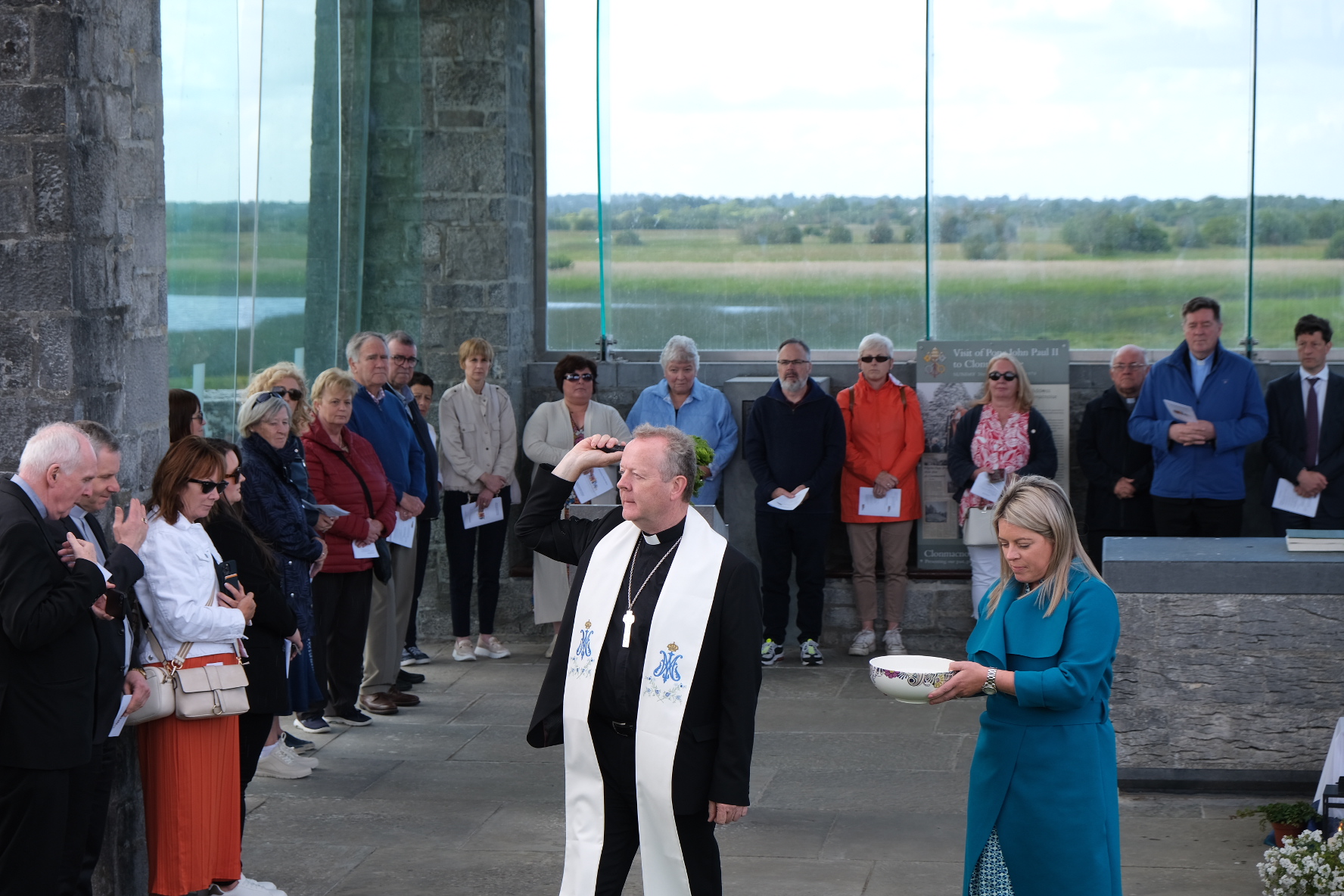Archbishop Eamon Martin’s Homily at the annual Mass and investiture of the Equestrian Order of the Holy Sepulchre of Jerusalem in Saint Patrick’s College Chapel, Maynooth

The coming weeks will see the publication of the synthesis document for the Church’s Synodal Pathway in Ireland prepared as a contribution to the next Synod of Bishops in Rome in October 2023.
Over the past nine months, tens of thousands of Catholics across Ireland have been engaging in prayerful listening and reflection on the theme chosen by the Pope Francis:
“For a Synodal Church: Communion, Participation, Mission.” Last month there was a unique gathering in Athlone and Clonmacnoise to pray and hear feedback from the hundreds of discussions and submissions collected across Ireland since last autumn. Despite the constraints of COVID-19, this initial phase represents a small but significant first step in developing a synodal style consultation of the Catholics of Ireland about the future of their Church.
In this homily I wish to focus on one of the critical features of a Synodal Church – that of communion – which is also a central theme in today’s Gospel passage. Here, Jesus uses the powerful image of the vine and the branches to describe the relationship between God and the members of the Church. Cut off from God we can achieve nothing; in communion with God, we can bear fruit in plenty.
Concerns have already been expressed in Ireland, and around the world, that the Synodal discussions could damage, rather than create, communion in the Church. Synodality is sometimes misunderstood as a kind of parliamentary, voting system where majority opinions might overturn longstanding Church tradition or core teaching. To guard against this possibility, Pope Francis has emphasised in his book Let us dream. The path to a better future, that the Synodal journey must always be guided by the Holy Spirit, and have its foundation in the Word of God, in prayer and in adoration. He writes (p 84-85):
“What is under discussion at Synodal gatherings are not traditional truths of Christian doctrine. The Synod is concerned mainly with how teaching can be lived and applied in the changing contexts of our time… What characterises as a Synodal path is the role of the Holy Spirit”.
It is vitally important that we work together here in Ireland to ensure that our ongoing Synodal journey will avoid divisiveness and polarisation of views, or degenerate into a kind of “them and us” adversarial process which loses sight of our shared belonging within the Church of Christ.
In the Gospel passage about the vine and the branches, Jesus emphasises twelve times the importance of being in communion with Him. The Greek verb used is manein – if you “abide in me”; If you “remain in me”. As if rooted in the same life-giving soil, we draw life from Him, and we are then able to support one another against danger and attack – for just as the vine is attacked by pests, diseases, or buffeted by storms, and other threats, so also we in the Church face tribulations from within and without. We can only survive these storms by standing together as members of one Church, united with Christ, our life-giver. Rooted in baptism, nourished by the Eucharist and other sacraments, pruned by penance, watered and sustained by God’s Word, we can produce a bountiful harvest. I am reminded in this context of the theme of the International Eucharistic Congress in Dublin, ten years ago: “Eucharist: Communion with Christ and with one another”.
A central goal therefore in any ‘Synodal-type’ gathering of bishops, priests, religious or faithful has to be the fostering of deeper communion in the Church, including a closer unity between the Pope, the bishops and the people of God throughout the world. After all, in unity and in diversity, we are one, holy Catholic and apostolic Church, which unites heaven and earth and which spans all time and all places.
This does not mean that we shouldn’t speak our minds in charity and in truth. Pope Francis encourages what he calls parrhesia – to speak with courage, boldness and with frankness, but not in a way which would hasten dissension or polarisation. Again he writes in Let us dream (p 85):
“Synods produce intense discussion, which is good: they involve different reactions and responses to those who think differently or have particular positions … We have also seen in many cases how, faced with disagreement, different groups attempting to interfere in the synodal process try to impose their ideas, either by applying pressure inside the Synod, or outside it, by distorting and discrediting the views of those who do not think as they do”.
I remember Pope Benedict XVI once remarking that Jesus did not say, ‘You are the vine’, but, ‘I am the vine; you are the branches’. The Synodal way should therefore be one of prayerful and collaborative discernment of God’s will, always remembering that it is Christ’s Church, not ours to create at will to our specifications. Synodality should not diminish the teaching authority of the Pope and the bishops, but rather affirms and enhances it, by calling the Magisterium, in communion with Christ, to deep listening with discernment and in humble service.
Here in Ireland our Synodal journey is taking place at a critical moment in our history. Seven years from now, in 2029, we will mark two hundred years since Catholic Emancipation. I cannot help thinking that in doing so we will be drawing to a close a significant chapter in the life of the Church here, while at the same time opening a new one. We can justifiably reflect back in thanksgiving for a period in which the Catholic Church in Ireland became a vibrant, faithful, and missionary Church, one which looked after not only the spiritual needs of the faithful, but also contributed generously to health, to education and community cohesion, to care for the poor and outreach to the marginalised in society. We cannot ignore, however, the shadow side – the failures in mission, the clerical and institutional abuse scandals, the holding on to power and status that sometimes ‘obscured the light of the Gospel’, and left behind a legacy of pain and trauma for many.
When the Synodal synthesis document is published in a few weeks time, it will reveal many challenges for the handing on of the faith in this country, including a need for inner healing and hope. It will acknowledge and reflect on the impact of a major decline in the practice of the faith, and in vocations to priesthood, to the religious life and to sacramental marriage. Many have called for greater transparency, participation in decision making and accountability within our parish and diocesan church structures. We have heard about the importance of renewing our connection with the energy and gifts of our young people and of finding fresh models of responsibility and leadership which will especially recognise and facilitate the role of women, as well as men. Our listening process has identified the need to reach out to the many people who have left Church behind and in some cases feel excluded, forgotten or ignored.
As we face this reality, the parable of the vine and the branches once more has something challenging to offer. Jesus refers to his Father as “vinedresser” who sometimes must reach for the secateurs – to prune those branches that are bearing fruit and to remove the withered branches and throw them on the fire or compost heap.
In discerning the will of God the Father, we must be conscious, however, that pruning is an art – done well the vine will flourish with new growth and abundant fruit: done badly, it can grievously wound or even kill the plant. That is why we must pray and work for communion in our Synodal pathway which will enable us to be guided by the Holy Spirit in setting down together the foundations for a new chapter in the life of the Church in Ireland. Ten years from now, in the Patrician year 2032, we will celebrate the 16th centenary of the coming of Christianity to Ireland. My prayer and hope is that during this decade we will be honest with ourselves, having the courage to ‘let go’ of those ways of being Church which may have served us well in the past, but which no longer respond to the urgent and primary need for new evangelisation in our country.
This is not a time, as some might think, to hunker down and try to wall off the vineyard of the Lord from the challenges of the world around us. On the contrary, this is our time and space to be missionary disciples, working together in solidarity and communion to offer the hope that faith in Christ brings.
The next chapter in the life of the Church in Ireland will be different to the last – the Catholic Church may find itself increasingly marginalised in public debate, but we must remain: a Church that is outward looking, confident and prophetic in the dialogue and encounter between faith and culture; a Church which proclaims with conviction the Good News of salvation in Christ; a Church which chooses life, and which cares for the beauty and wonder of God’s creation while always pointing beyond this world and enkindling a longing for eternal life; a Church which brings to our troubled world and its many lonely and wounded people, the message that ‘Christ is alive’, ‘Christ is our hope!’ We must become, as many have said, a Church which serves, a Church which is more about mission than maintenance, more about movements than monuments.
It is therefore vital that when the synthesis of this first phase of our Synodal pathway is published, we study its findings carefully and prayerfully. There is a need for a further phase of much deeper listening and a more widespread reaching out. We have so far merely touched the surface. There will be those who feel confident that we are already on the right track; others will disagree with what has been said so far, and warn that we are already going astray. Some clearly don’t feel ready or welcome to participate or contribute and, regrettably, many others have not yet have even heard of the Synodal Pathway!
Perhaps the greatest learning for us so far will emerge from reflecting ‘prayerfully and carefully’ on what these tentative first steps along a Synodal Pathway have taught us about who we are as the Catholic Church in Ireland, and why we are this way? It is in this deeper reflection that we can discern what the Holy Spirit is revealing to us about the kind of pastoral conversion and new evangelisation necessary to nurture new life and growth in the vineyard of the Lord? Crucially, in all these deliberations, we must pledge to stand together in communion, because only in this way will people be attracted by the hope of an encounter with Christ and by the joy of His gospel.





You must be logged in to post a comment.